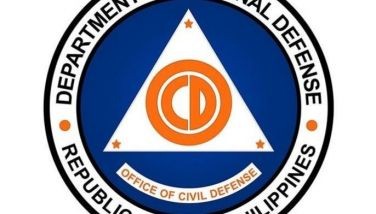New defense pact reflects cozier US-Philippine alliance
MANILA, Philippines — A new defense pact that will allow thousands of U.S. troops to be temporarily based in Philippines for the first time in more than 20 years signals closer cooperation in the allies' hot-and-cold relationship that has been shaped over the decades by war, terrorism and now, jitters over China's rise.
The 10-year agreement, signed Monday as President Barack Obama arrived in Manila, was considered the centerpiece of his four-nation Asian trip, which Obama used to reassure allies like Japan and the Philippines of American military backing as they wrangle with China in increasingly tense territorial disputes.
Obama said the Enhanced Defense Cooperation Agreement showed that Manila and Washington have emerged from a rough period in their alliance.
"We're here in the Philippines signing a defense agreement," he said at a news conference with President Benigno Aquino III at the presidential palace. "Ten years ago, 15 years ago, there was enormous tensions around our defense relationship with the Philippines."
The pact will allow thousands of rotating batches of U.S. forces to gain temporary access to mutually chosen Philippine military camps, paving the way for the largest U.S. military deployment in the country since U.S. bases here were closed in 1992. It will also allow the United States to station fighter jets, ships and surveillance equipment in the Philippines on a limited basis.
China's growing military might and assertiveness in the region has helped bring the two nations closer together.
The Philippines has struggled to bolster its territorial defense amid disputes with China, including the Scarborough Shoal, a rich fishing ground off the northwestern Philippines that Beijing took effective control of in 2012. Chinese coast guard ships last year surrounded another contested offshore territory, the Second Thomas Shoal, where Filipino marines are manning a rusty, grounded ship.
Obama said the defense agreement was not meant to counter China but to promote peace and stability in Asia amid a much-touted "pivot" by Washington to the Pacific. But he made it clear the U.S. would honor its commitment to defend Manila under a 1951 Mutual Defense Treaty.
"Let me be absolutely clear," Obama said at a Philippine army gymnasium Tuesday, standing in front of an assembly of American and Filipino soldiers in combat uniform. "Our commitment to defend the Philippines is ironclad."
Underscoring his point, Obama quoted lines from the 1951 treaty, where both nations pledged a "common determination to defend themselves against external armed attacks, so that no potential aggressor could be under the illusion that either of them stands alone."
Earlier in his trip, Obama also said the U.S. would obligated to defend Tokyo in any confrontation with Beijing over a cluster of disputed islands in the East China Sea, even as urged all sides to resolve the dispute peacefully.
Former Philippine national security adviser Roilo Golez said Manila wanted the larger U.S. presence to deter China.
The U.S. "is surrounding China. It's very obvious even to the most elementary strategy student," he said. "If the U.S. is not there, then the Philippines would be helpless."
The countries have had a roller-coaster relationship going back more than a century — including several decades when the Philippines was a U.S. colony.
America's foray into the Philippines started when it defeated the Spanish fleet in the Battle of Manila Bay in 1898, ending more than three centuries of Spanish colonization. But the Philippines was ceded shortly after to the United States and only gained independence in 1946, a colonization that was disrupted by the invasion and occupation of the Japanese imperial army.
After World War II, the U.S. maintained bases in the Philippines for nearly a half-century, but those were shuttered in 1992 amid rising nationalism, and military ties between the nations became virtually frozen.
Territorial disputes with China in the mid-1990s prompted Manila to reach out to Washington.
The Philippines discovered that Beijing has taken control of the Mischief Reef off its western coast and built hut-like structures over the submerged coral outcrops. In 1998, the U.S. and Philippines signed a treaty that allowed large military exercises to resume in the country.
The Sept. 11, 2001, attacks brought the U.S. and Philippine militaries closer, with Filipino officials allowing hundreds of American counterterrorism troops to train Filipino soldiers fighting al-Qaida-linked militants in the south.
Relations soured again in 2004 when the Philippines ordered an early withdrawal of its small peacekeeping contingent in Iraq to comply with the demand of Iraqi insurgents who threatened to behead a kidnapped Filipino worker. The decision angered U.S. officials.
At the army gymnasium, Obama paid tribute to some of the surviving American and Filipino World War II veterans.
In April 1942, after the Japanese invasion of the Philippines, tens of thousands of sick and exhausted U.S. and Filipino prisoners were forced to trek for five days for 105 kilometers (65 miles) to a prison camp in the infamous "Bataan Death March." Survivors have recounted how many prisoners were stabbed or decapitated by their Japanese captors if they stopped to drink or collapsed from exhaustion.
"I am never prouder than being able to stand before you as your commander-in-chief," he told the veterans before posing for photos with them.
Sitting in a wheelchair and wearing his medals, a 91-year-old veteran, Ret. Col. Romeo Castro, shook Obama's hand. He told a reporter that said he wanted the U.S.-Philippine alliance to last "forever" to counter external threats like the Japanese before and China now.
"We need them to protect us from our enemies," Castro said.
- Latest
- Trending



























